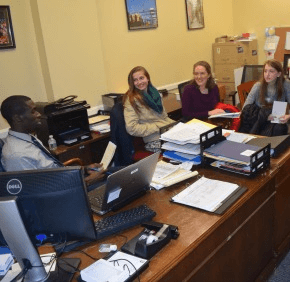
Cathy Gara, a parishioner of St. Thomas Aquinas in Hampden, gets ready to visit the House Office Building in Annapolis to talk to her delegates. (Erik Zygmont/CR Staff)

Mary Ellen Russell, executive director of the Maryland Catholic Conference, briefs Catholics from across Maryland at St. John Neumann Mission Church in Annapolis before they head out to visit their legislators Feb. 15. (Erik Zygmont/CR Staff)
Vonetta Edwards, a parishioner of St. Ignatius in Baltimore, said she was focusing her advocacy on paid sick leave and the Maryland Law Enforcement Government Trust Act, which would define when local law enforcement participates in federal immigration enforcement activities and prevent stops and arrests on the sole basis for determining immigration status.
Also see:
Maryland lawmakers hear testimony on paid sick leave
As Maryland legislative session opens, Catholics expect a strenuous 90 days


